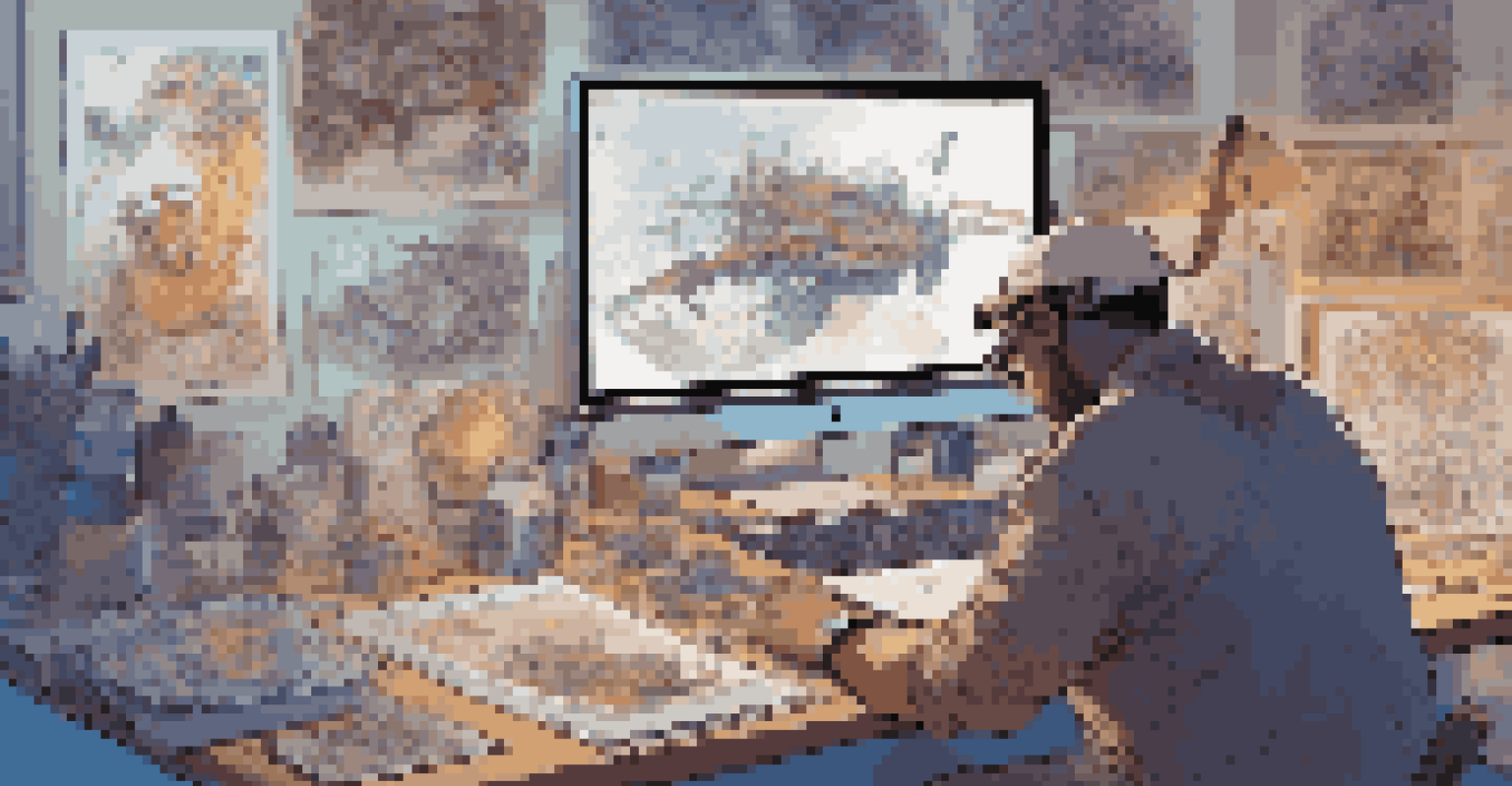How Augmented Reality is Creating New Job Opportunities

Understanding Augmented Reality and Its Potential
Augmented Reality (AR) is a technology that overlays digital information onto the real world, enhancing our perception of reality. Imagine wearing glasses that not only let you see your surroundings but also display helpful information, like navigation directions or product details. This seamless blend of the digital and physical worlds is revolutionizing how we interact with our environment, making it an exciting space for innovation.
Augmented Reality will change the way we interact with the world around us, creating new experiences that blend the digital with the physical.
The potential of AR extends far beyond gaming or marketing; it’s reshaping entire industries. From healthcare to education, AR is providing new ways for professionals to interact with their work. This transformative technology is not just a tool, but a gateway to new career opportunities that didn’t exist a decade ago.
As AR continues to evolve, so too does the demand for skilled professionals who can harness its capabilities. With businesses eager to adopt this technology, now is the perfect time for individuals to explore how they can position themselves in this burgeoning field.
New Job Roles Emerging in the AR Ecosystem
As AR technology progresses, a range of new job roles are emerging, catering to various skills and expertise. For instance, AR developers are in high demand, tasked with creating immersive experiences that engage users. These developers combine programming skills with a creative flair to design applications that can be used in everything from training simulations to interactive marketing campaigns.

In addition to developers, roles such as AR designers and UX/UI specialists are becoming increasingly vital. These professionals focus on the user experience, ensuring that the AR applications are not only functional but also enjoyable to use. Their work is crucial in making AR accessible and appealing to a broader audience.
AR Creates New Job Opportunities
The rise of augmented reality is generating a wide array of job roles across various industries, from developers to educators.
Furthermore, project managers with a strong understanding of AR technology are needed to oversee these innovative projects. They play a critical role in coordinating teams and ensuring that AR initiatives align with business goals, making this a dynamic career path for those with leadership skills.
AR in Healthcare: A Growing Field for Professionals
The healthcare sector is one of the most promising fields for AR job opportunities. Surgeons and medical professionals are increasingly using AR for training and surgical procedures, enhancing precision and outcomes. For example, AR can project 3D images of a patient's anatomy during surgery, providing surgeons with critical information in real-time.
The future of education is not about the technology itself, but how we can leverage it to enhance learning and engagement.
This integration of technology requires a new breed of healthcare professionals who can navigate both medical and technological landscapes. Roles such as AR training specialists are emerging, who educate medical staff on how to effectively use AR tools. This combination of skills is invaluable in advancing healthcare practices.
Moreover, companies developing AR solutions for healthcare are also looking for marketers and sales representatives who understand the technical aspects of their products. This creates diverse opportunities for those interested in both technology and healthcare, highlighting the expansive potential of AR in this field.
Education and Training: Shaping Future AR Experts
The education sector is leveraging AR to enhance learning experiences, paving the way for new teaching roles. Educators who can integrate AR into their curriculums are now sought after, as they engage students in interactive learning. For instance, AR can bring historical events to life or enable students to visualize complex scientific concepts, making lessons more impactful.
In addition to teaching roles, there’s a growing need for instructional designers who specialize in creating AR-based educational content. These professionals focus on designing interactive modules that facilitate learning through simulation and engagement, making education more accessible and enjoyable.
Healthcare Benefits from AR
Augmented reality is transforming healthcare by improving training and surgical precision, creating demand for specialized roles.
As more educational institutions adopt AR, the demand for training programs and workshops to upskill educators will also rise. This opens up opportunities for those interested in training and development, further expanding the job market within the AR landscape.
AR in Retail: Enhancing Customer Experience
The retail industry is another sector experiencing a surge in AR job roles. Retailers are using AR to enhance the shopping experience, allowing customers to visualize products in their environment before making a purchase. This technology not only boosts customer satisfaction but also reduces return rates, making it a win-win for businesses.
As a result, there is a growing demand for AR marketing specialists who can create engaging campaigns that leverage this technology. These professionals work to develop strategies that attract customers and showcase products in innovative ways, ultimately driving sales.
Additionally, retail companies are looking for data analysts who can interpret customer interactions with AR applications. Understanding how customers engage with AR can provide valuable insights that help businesses refine their offerings and improve the overall shopping experience.
Gaming Industry: A Hotbed for AR Career Opportunities
The gaming industry has long been a leader in adopting AR technology, creating a plethora of job opportunities for enthusiasts. Game designers, developers, and artists are all crucial to bringing AR experiences to life, allowing players to interact with virtual elements in real-world settings. This immersive experience is a significant draw for gamers and has transformed how games are developed and played.
As AR gaming continues to evolve, new roles are emerging, such as AR game testers who ensure that new features operate smoothly across devices. These testers play a vital role in maintaining the quality of gaming experiences, as they help identify bugs and provide feedback before a game’s release.
AR Enhances Retail Experiences
Retailers are leveraging AR technology to enhance customer experiences, leading to new roles in marketing and data analysis.
Furthermore, marketing professionals specializing in AR gaming are essential for promoting these interactive experiences. They craft campaigns that highlight the unique aspects of AR games, appealing to both gamers and non-gamers alike, which is crucial for expanding the audience base.
Challenges and Skills Needed for AR Careers
While the opportunities in AR are exciting, they come with their own set of challenges. Professionals entering this field must be adaptable and willing to continuously learn, as AR technology is constantly evolving. Keeping up with new tools, programming languages, and design principles is essential for success in this dynamic environment.
Key skills that are increasingly valuable in AR careers include creativity, technical proficiency, and a strong understanding of user experience design. Professionals who can blend these skills will likely stand out in the job market, making them more attractive to potential employers.

Additionally, collaboration is essential in AR projects, as these often involve cross-disciplinary teams. Being able to communicate effectively with colleagues from various backgrounds, such as developers, designers, and marketers, is crucial for creating successful AR applications.
The Future of AR Jobs: What to Expect
Looking ahead, the future of AR jobs appears bright, with an increasing number of industries adopting this technology. As AR continues to integrate into everyday life, the variety of job roles will expand even further, catering to diverse skill sets and interests. This growth will likely lead to new educational programs and training opportunities focused on AR.
Moreover, the continued innovation in AR technology will drive demand for professionals who can think creatively and push the boundaries of what’s possible. Those who are proactive in developing their skills and understanding of AR will find themselves well-positioned in this expanding job market.
Ultimately, as AR becomes more prevalent across various sectors, it will not only create new job opportunities but also redefine existing roles. Embracing this change and preparing for the future of AR jobs will be essential for anyone looking to thrive in this exciting field.